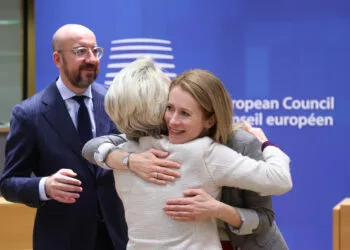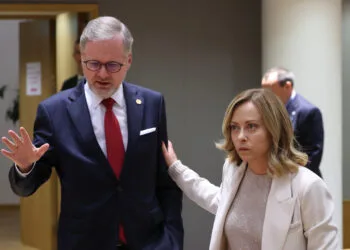Brussels – The European Council table is hot, and by dinnertime, the main course is ready: The EU nominations for the heads of the main institutions of the Union. The package is always the same, but unlike the June 17 informal meeting, today (June 27) at the Europa Palace, there is a distinct feeling that the consensus among the overwhelming majority of the heads of state and government of the 27 EU member states is now solid, despite the fact that in the last twenty-four hours the “Meloni case“ has broken out. Because now the general understanding among the three European political families that hold the centrist majority at the European Parliament—Populars, Socialists, and Liberals—is explicit, and from the words of the EU leaders, it is hard to see what morsel could make the dinner and the whole package of EU appointments indigestible.
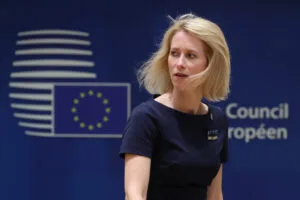
Ursula von der Leyen to the European Commission, António Costa to the European Council, and Kaja Kallas as EU High Representative for Foreign Affairs and Security Policy. This is the basis for today’s discussions among the Twenty-seven, which are set to the deal reached between the six negotiators of the three European political families Tuesday (June 25): Greek Prime Minister Kyriakos Mitsotakis, Polish Prime Minister Donald Tusk (for the European People’s Party), German Chancellor Olaf Scholz, and Spanish Prime Minister Pedro Sánchez (for the Party of European Socialism), the French President Emmanuel Macron, and the Dutch Prime Minister Mark Rutte (for Renew Europe). The final go-ahead for the EU appointments will require an enhanced qualified majority at the European Council, which, according to the Treaties, simultaneously requires two conditions: that 72 per cent of member states vote in favour (thus at least 20) and that they represent no less than 65 per cent of the total population of the Union.
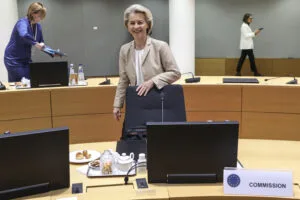
All in all, the underlying optimism for a speedy consummation of the main course at dinner tonight stems from the evidently relaxed moods in the parterre of heads of state and government before the European Council enters. “Sometimes you need a platform to make decisions smoother and facilitate dialogue, and we have reached a common position among the major forces in the European Parliament,” Polish Prime Minister Tusk confirmed. “This is not only an agreement between 27 heads of state and government, but also a question of what kind of political majority will have the presidency of the Commission in the European Parliament,” German Chancellor Scholz stressed, about the confirmation vote that —in case of an agreement at this EU summit—”can already be held on July 18 during the inaugural plenary session in Strasbourg,” as confirmed by the president of the EU Parliament, Roberta Metsola (ready for confirmation in the same session by the 720 MEPs).
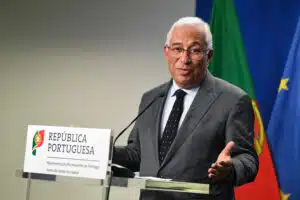
Support for the EU nomination package runs from the Swedish prime minister, Ulf Kristersson (EPP)—”We have good reason to say there is unity today; we have three very good names, highly respected and well known for their capacity for dialogue“—to outgoing Dutch premier Rutte (Renew)— “I expect a debate, but the three political families have an agreement”—to the Irish Taoiseach, Simon Harris(EPP): “There is no doubt, there is a clear consensus.”
Looking at the political composition of the governments represented at the European Council table, it is not surprising that an understanding between populars, socialists, and liberals leaves little room for doubt: 23 member countries out of 27 are led by leaders from one of these European families. Only Italy (unhappy PM Meloni is President of the Party of European Conservatives and Reformists), red-brown Slovakia represented today by President Robert Pellegrini, the Czech Republic (but the conservative premier, Petr Fiala, has already hinted that he will support the package) and the Hungary of Viktor Orbán, who has remained the only real opponent both in terms of content and modalities: “The agreement is a disgrace and is not based on the election result.” What the election said, however, is that the EPP has been strengthened, that the centrist majority holds and, above all, that the far right has no chance of proposing alternative majorities. Neither in Parliament nor at the European Council dinner.
English version by the Translation Service of Withub


